冀教版九年级上 Unit 4 Stories and Poems Lesson 19A Story or a Poem?课件(共39张PPT)
文档属性
| 名称 | 冀教版九年级上 Unit 4 Stories and Poems Lesson 19A Story or a Poem?课件(共39张PPT) |  | |
| 格式 | pptx | ||
| 文件大小 | 525.3KB | ||
| 资源类型 | 教案 | ||
| 版本资源 | 冀教版 | ||
| 科目 | 英语 | ||
| 更新时间 | 2022-06-06 15:27:58 | ||
图片预览


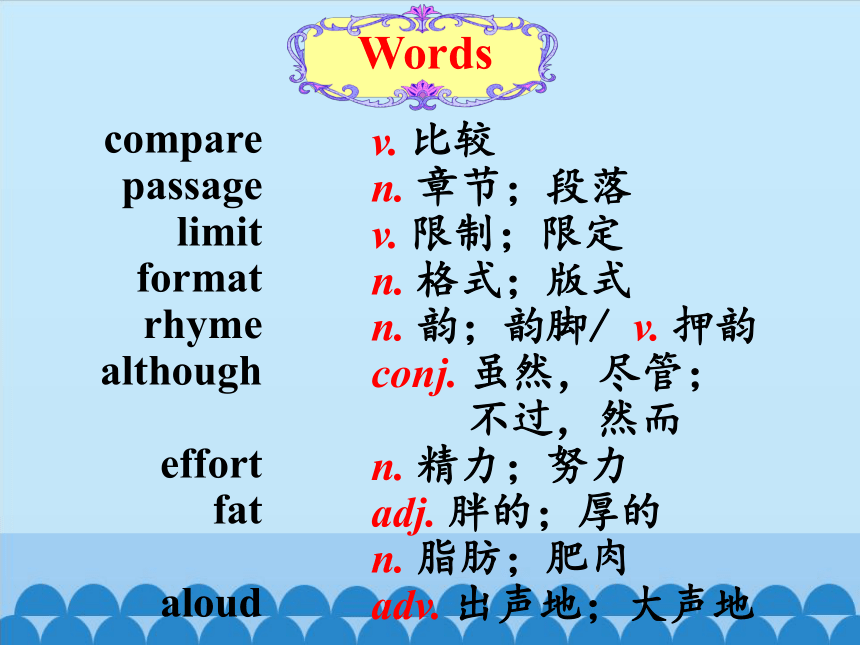
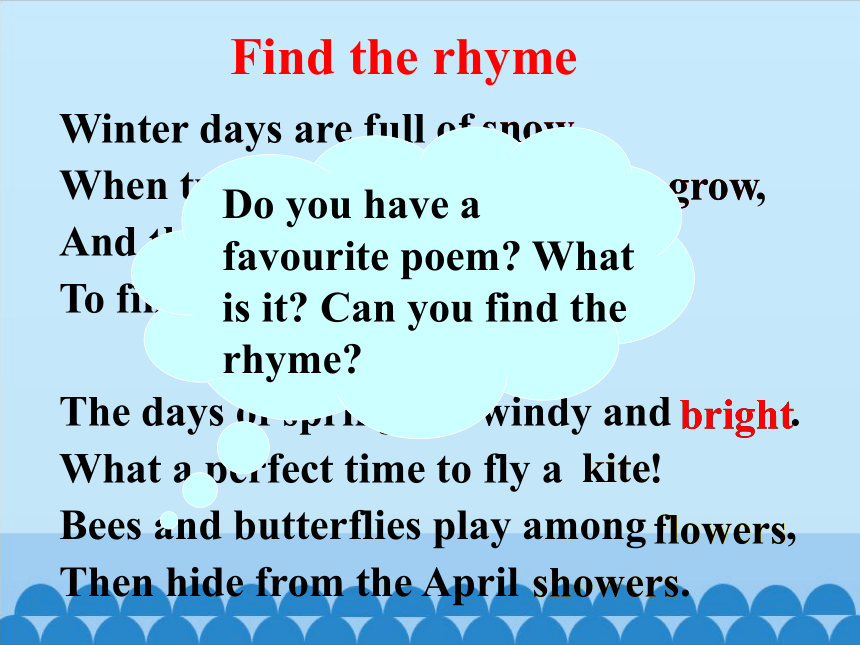
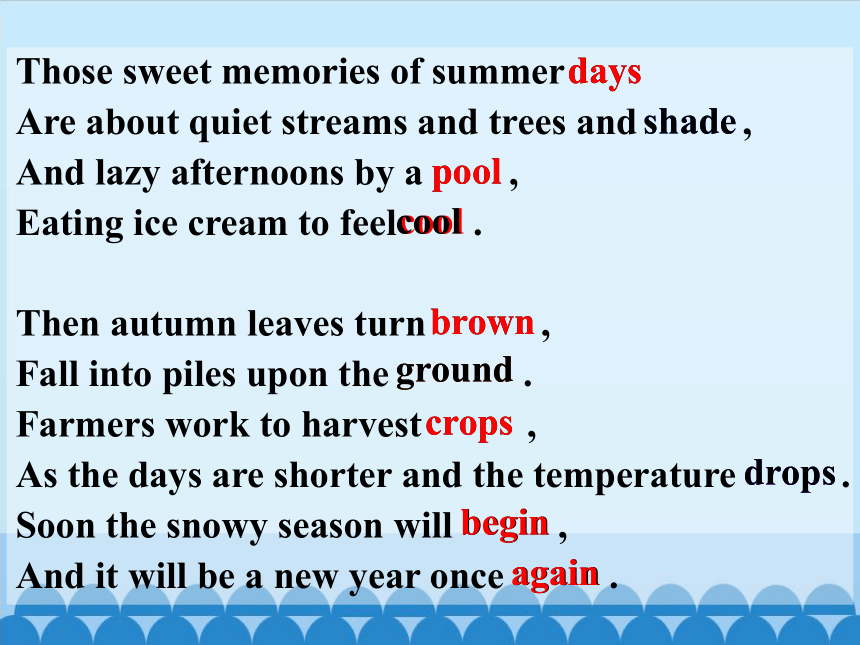
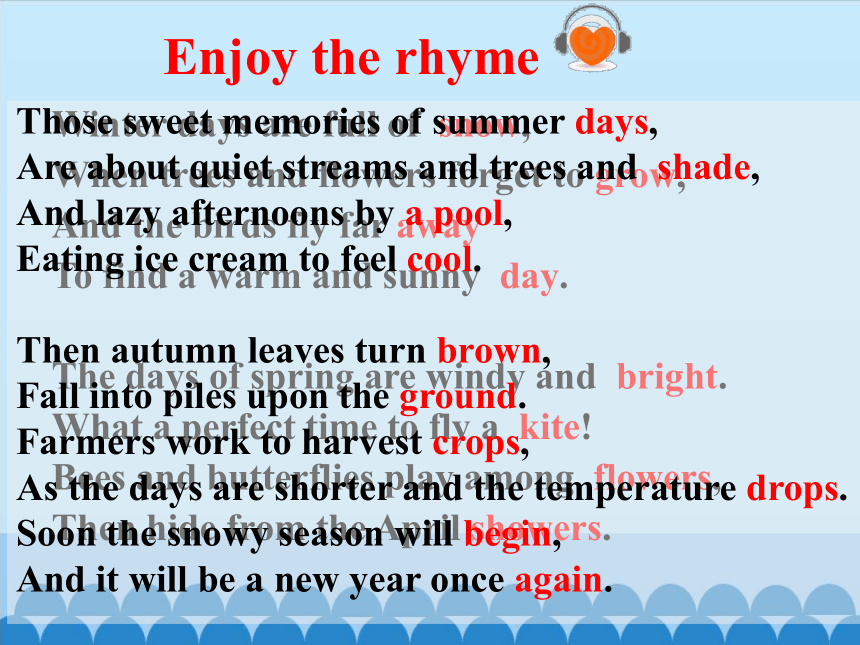
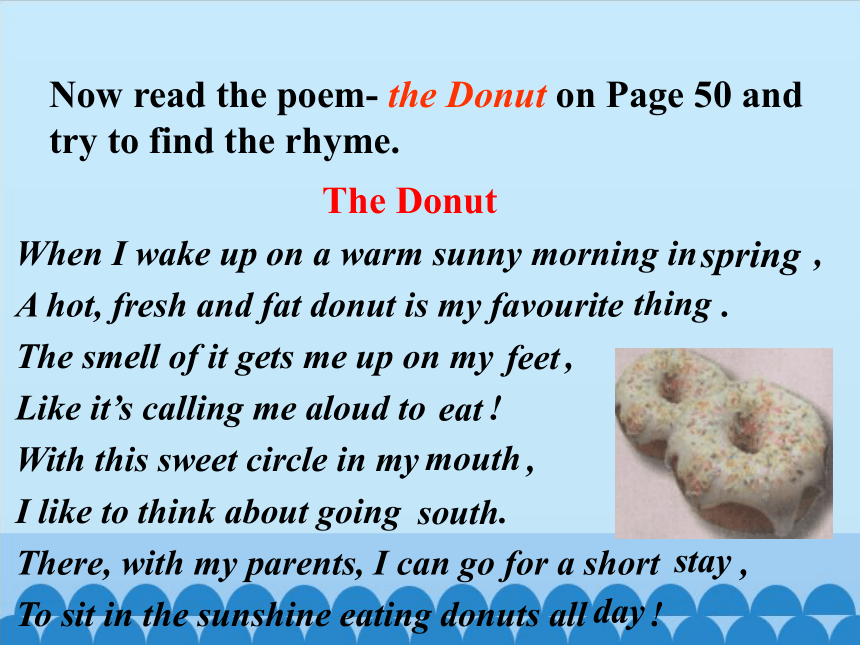
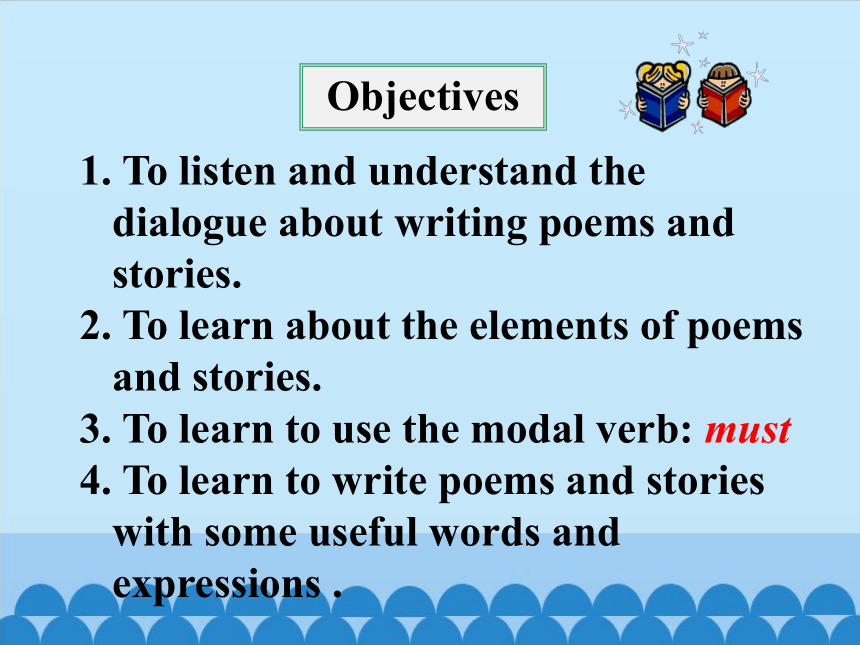
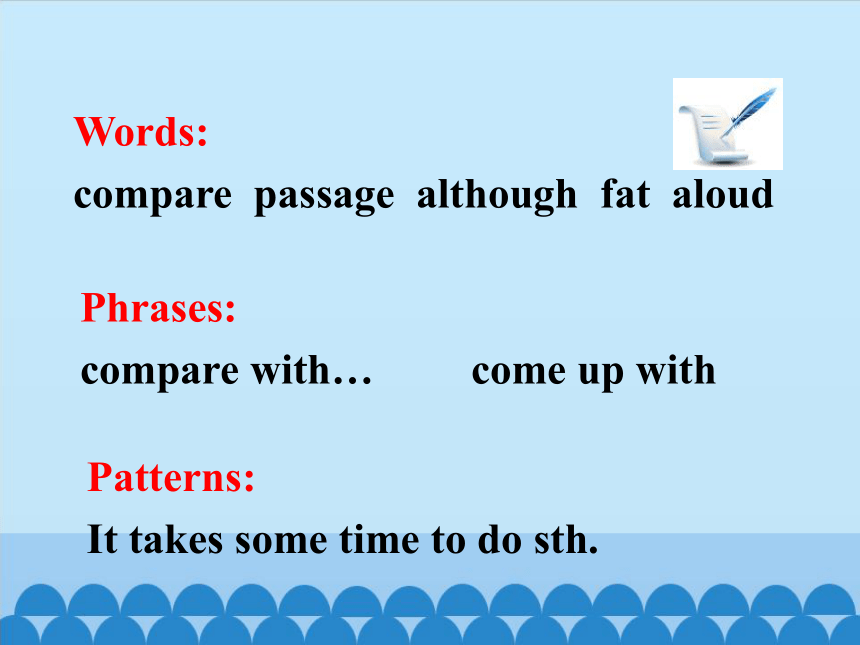

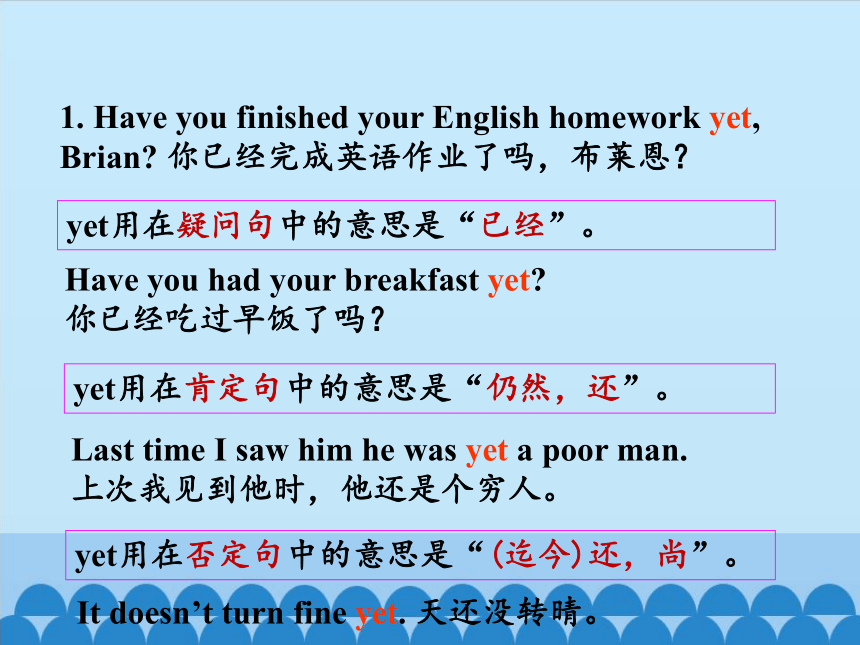
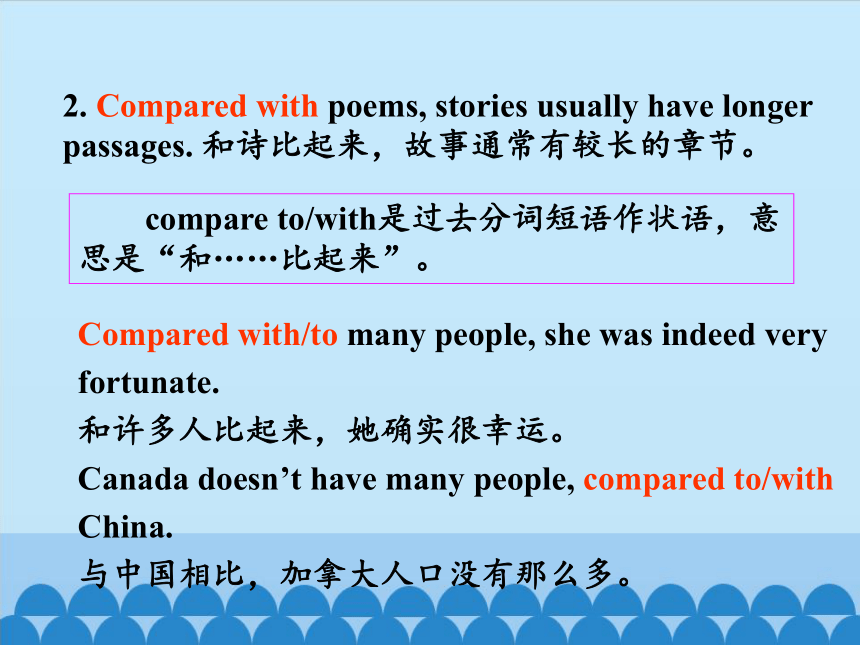
文档简介
(共39张PPT)
Lesson 19
Unit 4 Stories and Poems
Words
compare
passage
limit
format
rhyme
although
effort
fat
aloud
v. 比较
n. 章节;段落
v. 限制;限定
n. 格式;版式
n. 韵;韵脚/ v. 押韵
conj. 虽然,尽管;
不过,然而
n. 精力;努力
adj. 胖的;厚的
n. 脂肪;肥肉
adv. 出声地;大声地
Winter days are full of ,
When trees and flowers forget to ,
And the birds fly far
To find a warm and sunny .
The days of spring are windy and .
What a perfect time to fly a !
Bees and butterflies play among ,
Then hide from the April .
snow
grow
away
day
kite
flowers
bright
showers
snow
grow
away
day
bright
kite
flowers
showers
Find the rhyme
Do you have a favourite poem What is it Can you find the rhyme
Those sweet memories of summer
Are about quiet streams and trees and ,
And lazy afternoons by a ,
Eating ice cream to feel .
Then autumn leaves turn ,
Fall into piles upon the .
Farmers work to harvest ,
As the days are shorter and the temperature .
Soon the snowy season will ,
And it will be a new year once .
days
days
shade
shade
pool
pool
cool
cool
ground
brown
brown
ground
crops
crops
drops
drops
again
again
begin
begin
Enjoy the rhyme
Winter days are full of snow,
When trees and flowers forget to grow,
And the birds fly far away
To find a warm and sunny day.
The days of spring are windy and bright.
What a perfect time to fly a kite!
Bees and butterflies play among flowers,
Then hide from the April showers.
Those sweet memories of summer days,
Are about quiet streams and trees and shade,
And lazy afternoons by a pool,
Eating ice cream to feel cool.
Then autumn leaves turn brown,
Fall into piles upon the ground.
Farmers work to harvest crops,
As the days are shorter and the temperature drops.
Soon the snowy season will begin,
And it will be a new year once again.
Now read the poem- the Donut on Page 50 and try to find the rhyme.
The Donut
When I wake up on a warm sunny morning in ,
A hot, fresh and fat donut is my favourite .
The smell of it gets me up on my ,
Like it’s calling me aloud to !
With this sweet circle in my ,
I like to think about going .
There, with my parents, I can go for a short ,
To sit in the sunshine eating donuts all !
spring
thing
feet
eat
mouth
south
stay
day
1. To listen and understand the
dialogue about writing poems and stories.
2. To learn about the elements of poems and stories.
3. To learn to use the modal verb: must
4. To learn to write poems and stories with some useful words and
expressions .
Objectives
Words:
compare passage although fat aloud
Phrases:
compare with… come up with
Patterns:
It takes some time to do sth.
1
Read the lesson and fill in the blanks with the correct words.
Brian, Jenny and Danny learned about poems and stories this week. Their teacher, Ms. Cox, told them to write a _____ or a poem. Brian started writing his______. Jenny thought it was easier to write a story than to write a poem. But Danny didn’t think so. He said, “__________ with poems, stories are usually longer.” Jenny said, “A story doesn’t limit you like a ______ does. With poems, every word must have ______ and meaning. Sometimes writing less takes ______ effort than writing more.”
story
poem
Compared
poem
power
more
1. Have you finished your English homework yet, Brian 你已经完成英语作业了吗,布莱恩?
yet用在疑问句中的意思是“已经”。
Have you had your breakfast yet
你已经吃过早饭了吗?
yet用在肯定句中的意思是“仍然,还”。
Last time I saw him he was yet a poor man.
上次我见到他时,他还是个穷人。
yet用在否定句中的意思是“(迄今)还,尚”。
It doesn’t turn fine yet. 天还没转晴。
2. Compared with poems, stories usually have longer passages. 和诗比起来,故事通常有较长的章节。
compare to/with是过去分词短语作状语,意思是“和……比起来”。
Compared with/to many people, she was indeed very fortunate.
和许多人比起来,她确实很幸运。
Canada doesn’t have many people, compared to/with China.
与中国相比,加拿大人口没有那么多。
3. Although a poem has fewer words, it’s not always easier to write.
虽然诗歌用词较少,但写起来不总是容易的。
含有all, both, everybody, always, everywhere等含有“总括意义”的词的否定句是部分否定,而不是全部否定。
He is not always ready to help others.
他不总是乐意帮助别人。
All the boys are not here.(=Not all the boys are here.)
并非所有的男孩都在这儿。
4. …it can take a long time to come up with the right words.
需要花费很长时间才能想出恰当的词语。
come up with 提出;想出;赶上
We weren’t able to come up with any new suggestions.
我们提不出任何新建议。
I came up with them as they were rounding the corner.
他们正在拐弯时,我赶上了他们。
Are you familiar with these sentences
They are from the books we have learned.
1. Every story must have a beginning, a middle and an end.
2. You must use words very carefully because so few words are used in poems.
3. Every word must have power and meaning.
4. In the USA, when someone gives you a present, you must open it immediately.
5. In China, you must wait and open it later.
6. When you accept a present, you must use both hands.
7. And you must wrap hongbao in red paper because it’s lucky.
8. And you must eat lots of jiaozi.
to test your sense of observation.
to test your ability of short-term memory.
to test your ability to highlight the language points.
Guess
Guessing Games
1. Every story______ have a beginning, a middle and an end.
2. You _____ use words very carefully because so few words are used in poems.
3. Every word _____ have power and meaning.
4. In the USA, when someone gives you a present, you ______ open it immediately.
must
must
must
must
go
Ready
5. In China, you _____ wait and open it later.
6. When you accept a present, you ______ use both hands.
7. And you ______ wrap hongbao in red paper because it’s lucky.
8. And you _____ eat lots of jiaozi.
must
must
must
must
Modal Verb: must
情态动词: must
must是情态动词,没有人称或数的变化,后接动词原形,其主要用法如下:
1.表示义务或必要性,意思是“应该、必须”,通常用于肯定句及疑问句。
You must go to bed now.
你现在必须睡觉了。
Must I start at once
我必须立刻出发吗?
2. must的否定式是must not/ mustn’t,意思是“不应该、禁止”,语气较强烈。
You must not smoke here.
你不许在这里吸烟。
We mustn’t be late again.
我们不应该再迟到了。
3. 由must引出的一般疑问句,肯定回答用must,否定回答用needn’t, don’t need to或don’t have to均可,但不用mustn’t,因为mustn’t表示“不许、禁止”的意思,与问句的原意不符。
—Must I stay at home
我必须留在家里吗?
—Yes, you must.
是的,你必须留在家里。
— No, you needn’t. /No, you don’t have to.
不,不用了。
如果是反意疑问句,疑问部分一般不用needn’t, 而用mustn’t;否定回答时仍用needn’t, don’t need to或don’t have to.
—You must go on foot, mustn’t you
你必须走着去,是吗?
—Yes, I must.
是的,是这样。
— No, I needn’t. /No, I don’t have to.
不,不是的。
4. 当说话人对所发生的事情进行推测时,must的意思是“一定、准是”,主要用于肯定句,否定句常用can’t。
He must be a doctor.
他一定是个大夫。
She is not at home. She must be out.
她不在家里,她一定外出了。
注意:must表示推测,用于反意疑问句时,疑问部分不能用must, 应与其后面的动词保持一致。
She must be home, isn’t she
她一定在家里,是吗?
Tom must have a sister, hasn’t he / doesn’t he
汤姆肯定有一个妹妹,是吗?
5. must与have to的区别:
I must be off. Thank you for your help.
我得走了。谢谢你的帮助。
We have to be there early.
我们得早点去那儿。
1) 表示(主语)主观的义务或必要时用must;表示(主语)客观因素的义务或必要时用have to。have to含有“不得不”的意思。
2) have to可以放在will后面构成将来时,而must则不能。
误:He will must go there tomorrow.
正:He will have to go there tomorrow.
正:He must go there tomorrow.
他明天必须去那里。
Role-play
1. Role play the conversation in groups;
2. Role play the conversation in front of the class
Let’s see which group does the best.
Find the Rhyme
Match the rhyming pictures. Then draw your own picture cards that rhyme. Trade your cards with a partner and play ”Find the Rhyme”.
2
Read the lesson again and compare poems with stories.
poems
stories
b, c, e
a, d
a. It must have a beginning, a middle and an end.
b. Although it is short, every word must have power and meaning.
c. Usually fewer words are used.
d. It is longer and has more words.
e. You have to think about the format.
3
Try to change Danny’s poem with words you like. Share your new poem with your classmates.
When I wake up on a warm sunny morning in spring,
A_______ (adjective), ______ (adjective) and______ (adjective) ______(food) is my favorite thing.
The smell of it gets me up on my feet,
Like it’s calling me aloud to eat!
With this_____ (adjective) _____ (noun) in my mouth,
I like to think about going south.
There, with my ___ (person), I can go for a short stay,
To sit in the sunshine eating _____ (food) all day!
Time for reflection
compare to/with
come up with
not always
must
和……比起来
提出;想出;赶上
不总是
必须;一定
Ⅰ.根据汉语意思完成句子,每空一词。
1. 你的自行车怎么能和我的自行车相比呢
How does your bike ________ _____ mine
2. 她从一本小说中选了一段。
She took a _________ from a novel.
3. 虽然他很努力,但他考试没有及格。
________ he worked hard, he failed in
the exam.
compare with
passage
Although
4. 教师向学生大声朗诵这首诗。
The teacher read the poem ______ to the pupils.
5. 她在这里的成功靠努力和能力。 Her success here depends upon ______and ability.
6. 我相信,不论年龄或背景怎样,每个人都能够提出新颖的点子和精辟的见解。
I believe everyone, regardless of age or background,
can _____ ___ _____ new ideas and excellent insights.
aloud
effort
come up with
Ⅱ. 单项选择。
1. —“I think Helen is at home.”
—“No, she ____ be at home, for she phoned me
from the airport just five minutes ago.”
A. mustn’t B. needn’t
C. can’t D. daren’t
2. His room is dark. He must ____ to bed.
A. go B. be going
C. have gone D. have been gone
5. “Must he do it ” “No, he ____.”
A. mustn’t B. needn’t
C. doesn’t have to D. B or C
6. You must be a writer, ____ you
A. mustn’t B. are
C. must D. aren’t
Homework
Preview the words and expressions in Lesson 20.
My Favourite Food: Write a 4-line rhyming poem about your favourite food. Include a drawing of the food in the poem in a creative way.
Thank you.
Lesson 19
Unit 4 Stories and Poems
Words
compare
passage
limit
format
rhyme
although
effort
fat
aloud
v. 比较
n. 章节;段落
v. 限制;限定
n. 格式;版式
n. 韵;韵脚/ v. 押韵
conj. 虽然,尽管;
不过,然而
n. 精力;努力
adj. 胖的;厚的
n. 脂肪;肥肉
adv. 出声地;大声地
Winter days are full of ,
When trees and flowers forget to ,
And the birds fly far
To find a warm and sunny .
The days of spring are windy and .
What a perfect time to fly a !
Bees and butterflies play among ,
Then hide from the April .
snow
grow
away
day
kite
flowers
bright
showers
snow
grow
away
day
bright
kite
flowers
showers
Find the rhyme
Do you have a favourite poem What is it Can you find the rhyme
Those sweet memories of summer
Are about quiet streams and trees and ,
And lazy afternoons by a ,
Eating ice cream to feel .
Then autumn leaves turn ,
Fall into piles upon the .
Farmers work to harvest ,
As the days are shorter and the temperature .
Soon the snowy season will ,
And it will be a new year once .
days
days
shade
shade
pool
pool
cool
cool
ground
brown
brown
ground
crops
crops
drops
drops
again
again
begin
begin
Enjoy the rhyme
Winter days are full of snow,
When trees and flowers forget to grow,
And the birds fly far away
To find a warm and sunny day.
The days of spring are windy and bright.
What a perfect time to fly a kite!
Bees and butterflies play among flowers,
Then hide from the April showers.
Those sweet memories of summer days,
Are about quiet streams and trees and shade,
And lazy afternoons by a pool,
Eating ice cream to feel cool.
Then autumn leaves turn brown,
Fall into piles upon the ground.
Farmers work to harvest crops,
As the days are shorter and the temperature drops.
Soon the snowy season will begin,
And it will be a new year once again.
Now read the poem- the Donut on Page 50 and try to find the rhyme.
The Donut
When I wake up on a warm sunny morning in ,
A hot, fresh and fat donut is my favourite .
The smell of it gets me up on my ,
Like it’s calling me aloud to !
With this sweet circle in my ,
I like to think about going .
There, with my parents, I can go for a short ,
To sit in the sunshine eating donuts all !
spring
thing
feet
eat
mouth
south
stay
day
1. To listen and understand the
dialogue about writing poems and stories.
2. To learn about the elements of poems and stories.
3. To learn to use the modal verb: must
4. To learn to write poems and stories with some useful words and
expressions .
Objectives
Words:
compare passage although fat aloud
Phrases:
compare with… come up with
Patterns:
It takes some time to do sth.
1
Read the lesson and fill in the blanks with the correct words.
Brian, Jenny and Danny learned about poems and stories this week. Their teacher, Ms. Cox, told them to write a _____ or a poem. Brian started writing his______. Jenny thought it was easier to write a story than to write a poem. But Danny didn’t think so. He said, “__________ with poems, stories are usually longer.” Jenny said, “A story doesn’t limit you like a ______ does. With poems, every word must have ______ and meaning. Sometimes writing less takes ______ effort than writing more.”
story
poem
Compared
poem
power
more
1. Have you finished your English homework yet, Brian 你已经完成英语作业了吗,布莱恩?
yet用在疑问句中的意思是“已经”。
Have you had your breakfast yet
你已经吃过早饭了吗?
yet用在肯定句中的意思是“仍然,还”。
Last time I saw him he was yet a poor man.
上次我见到他时,他还是个穷人。
yet用在否定句中的意思是“(迄今)还,尚”。
It doesn’t turn fine yet. 天还没转晴。
2. Compared with poems, stories usually have longer passages. 和诗比起来,故事通常有较长的章节。
compare to/with是过去分词短语作状语,意思是“和……比起来”。
Compared with/to many people, she was indeed very fortunate.
和许多人比起来,她确实很幸运。
Canada doesn’t have many people, compared to/with China.
与中国相比,加拿大人口没有那么多。
3. Although a poem has fewer words, it’s not always easier to write.
虽然诗歌用词较少,但写起来不总是容易的。
含有all, both, everybody, always, everywhere等含有“总括意义”的词的否定句是部分否定,而不是全部否定。
He is not always ready to help others.
他不总是乐意帮助别人。
All the boys are not here.(=Not all the boys are here.)
并非所有的男孩都在这儿。
4. …it can take a long time to come up with the right words.
需要花费很长时间才能想出恰当的词语。
come up with 提出;想出;赶上
We weren’t able to come up with any new suggestions.
我们提不出任何新建议。
I came up with them as they were rounding the corner.
他们正在拐弯时,我赶上了他们。
Are you familiar with these sentences
They are from the books we have learned.
1. Every story must have a beginning, a middle and an end.
2. You must use words very carefully because so few words are used in poems.
3. Every word must have power and meaning.
4. In the USA, when someone gives you a present, you must open it immediately.
5. In China, you must wait and open it later.
6. When you accept a present, you must use both hands.
7. And you must wrap hongbao in red paper because it’s lucky.
8. And you must eat lots of jiaozi.
to test your sense of observation.
to test your ability of short-term memory.
to test your ability to highlight the language points.
Guess
Guessing Games
1. Every story______ have a beginning, a middle and an end.
2. You _____ use words very carefully because so few words are used in poems.
3. Every word _____ have power and meaning.
4. In the USA, when someone gives you a present, you ______ open it immediately.
must
must
must
must
go
Ready
5. In China, you _____ wait and open it later.
6. When you accept a present, you ______ use both hands.
7. And you ______ wrap hongbao in red paper because it’s lucky.
8. And you _____ eat lots of jiaozi.
must
must
must
must
Modal Verb: must
情态动词: must
must是情态动词,没有人称或数的变化,后接动词原形,其主要用法如下:
1.表示义务或必要性,意思是“应该、必须”,通常用于肯定句及疑问句。
You must go to bed now.
你现在必须睡觉了。
Must I start at once
我必须立刻出发吗?
2. must的否定式是must not/ mustn’t,意思是“不应该、禁止”,语气较强烈。
You must not smoke here.
你不许在这里吸烟。
We mustn’t be late again.
我们不应该再迟到了。
3. 由must引出的一般疑问句,肯定回答用must,否定回答用needn’t, don’t need to或don’t have to均可,但不用mustn’t,因为mustn’t表示“不许、禁止”的意思,与问句的原意不符。
—Must I stay at home
我必须留在家里吗?
—Yes, you must.
是的,你必须留在家里。
— No, you needn’t. /No, you don’t have to.
不,不用了。
如果是反意疑问句,疑问部分一般不用needn’t, 而用mustn’t;否定回答时仍用needn’t, don’t need to或don’t have to.
—You must go on foot, mustn’t you
你必须走着去,是吗?
—Yes, I must.
是的,是这样。
— No, I needn’t. /No, I don’t have to.
不,不是的。
4. 当说话人对所发生的事情进行推测时,must的意思是“一定、准是”,主要用于肯定句,否定句常用can’t。
He must be a doctor.
他一定是个大夫。
She is not at home. She must be out.
她不在家里,她一定外出了。
注意:must表示推测,用于反意疑问句时,疑问部分不能用must, 应与其后面的动词保持一致。
She must be home, isn’t she
她一定在家里,是吗?
Tom must have a sister, hasn’t he / doesn’t he
汤姆肯定有一个妹妹,是吗?
5. must与have to的区别:
I must be off. Thank you for your help.
我得走了。谢谢你的帮助。
We have to be there early.
我们得早点去那儿。
1) 表示(主语)主观的义务或必要时用must;表示(主语)客观因素的义务或必要时用have to。have to含有“不得不”的意思。
2) have to可以放在will后面构成将来时,而must则不能。
误:He will must go there tomorrow.
正:He will have to go there tomorrow.
正:He must go there tomorrow.
他明天必须去那里。
Role-play
1. Role play the conversation in groups;
2. Role play the conversation in front of the class
Let’s see which group does the best.
Find the Rhyme
Match the rhyming pictures. Then draw your own picture cards that rhyme. Trade your cards with a partner and play ”Find the Rhyme”.
2
Read the lesson again and compare poems with stories.
poems
stories
b, c, e
a, d
a. It must have a beginning, a middle and an end.
b. Although it is short, every word must have power and meaning.
c. Usually fewer words are used.
d. It is longer and has more words.
e. You have to think about the format.
3
Try to change Danny’s poem with words you like. Share your new poem with your classmates.
When I wake up on a warm sunny morning in spring,
A_______ (adjective), ______ (adjective) and______ (adjective) ______(food) is my favorite thing.
The smell of it gets me up on my feet,
Like it’s calling me aloud to eat!
With this_____ (adjective) _____ (noun) in my mouth,
I like to think about going south.
There, with my ___ (person), I can go for a short stay,
To sit in the sunshine eating _____ (food) all day!
Time for reflection
compare to/with
come up with
not always
must
和……比起来
提出;想出;赶上
不总是
必须;一定
Ⅰ.根据汉语意思完成句子,每空一词。
1. 你的自行车怎么能和我的自行车相比呢
How does your bike ________ _____ mine
2. 她从一本小说中选了一段。
She took a _________ from a novel.
3. 虽然他很努力,但他考试没有及格。
________ he worked hard, he failed in
the exam.
compare with
passage
Although
4. 教师向学生大声朗诵这首诗。
The teacher read the poem ______ to the pupils.
5. 她在这里的成功靠努力和能力。 Her success here depends upon ______and ability.
6. 我相信,不论年龄或背景怎样,每个人都能够提出新颖的点子和精辟的见解。
I believe everyone, regardless of age or background,
can _____ ___ _____ new ideas and excellent insights.
aloud
effort
come up with
Ⅱ. 单项选择。
1. —“I think Helen is at home.”
—“No, she ____ be at home, for she phoned me
from the airport just five minutes ago.”
A. mustn’t B. needn’t
C. can’t D. daren’t
2. His room is dark. He must ____ to bed.
A. go B. be going
C. have gone D. have been gone
5. “Must he do it ” “No, he ____.”
A. mustn’t B. needn’t
C. doesn’t have to D. B or C
6. You must be a writer, ____ you
A. mustn’t B. are
C. must D. aren’t
Homework
Preview the words and expressions in Lesson 20.
My Favourite Food: Write a 4-line rhyming poem about your favourite food. Include a drawing of the food in the poem in a creative way.
Thank you.
同课章节目录
- Unit 1 Stay Healthy
- Lesson 1 What's Wrong,Danny?
- Lesson 2 A Visit to the Dentist
- Lesson 3 Good Food, Good Health
- Lesson 4 Don't Smoke, Please!
- Lesson 5 Jane's Lucky Life
- Lesson 6 Stay Away from the Hospital
- Unit Review
- Unit 2 Great People
- Lesson 7 What Is the Meaning of Lift?
- Lesson 8 A Universe of Thought
- Lesson 9 China's Most Famous "Farmer"
- Lesson 10 Touch the World
- Lesson 11 To China, with Love
- Lesson 12 Guess My Hero!
- Unit Review
- Unit 3 Safety
- Lesson 13 Be Careful,Danny!
- Lesson 14 Accidents Happen
- Lesson 15 My Helmet Saved My Life!
- Lesson 16 How Safe Is Your Home?
- Lesson 17 Staying Safe in an Earthquake
- Lesson 18 Never Catch a Dinosaur
- Unit Review
- Unit 4 Stories and poems
- Lesson 19 A Story or a Poem?
- Lesson 20 Say It in Five
- Lesson 21 The Fable of the Woodcutte
- Lesson 22 The Giant(Ⅰ)
- Lesson 23 The Giant(Ⅱ)
- Lesson 24 Writing a Poem
- Unit Review
- Unit 5 Look into Science
- Lesson 25 Let's Do an Experiment!
- Lesson 26 Keep the Candle Burning
- Lesson 27 Planet Danny
- Lesson 28 The Study of Living Things
- Lesson 29 DNA—The Story of You
- Lesson 30 Science Affects Us
- Unit Review
- Unit 6 Movies and Theate
- Lesson 31 A movie or a Play
- Lesson 32 Moving Pictures
- Lesson 33 The Fisherman and the Goldfish(Ⅰ)
- Lesson 34 The Fisherman and the Goldfish(Ⅱ)
- Lesson 35 Theatres Are Fun!
- Lesson 36 Making Plays Is Fun
- Unit Review
